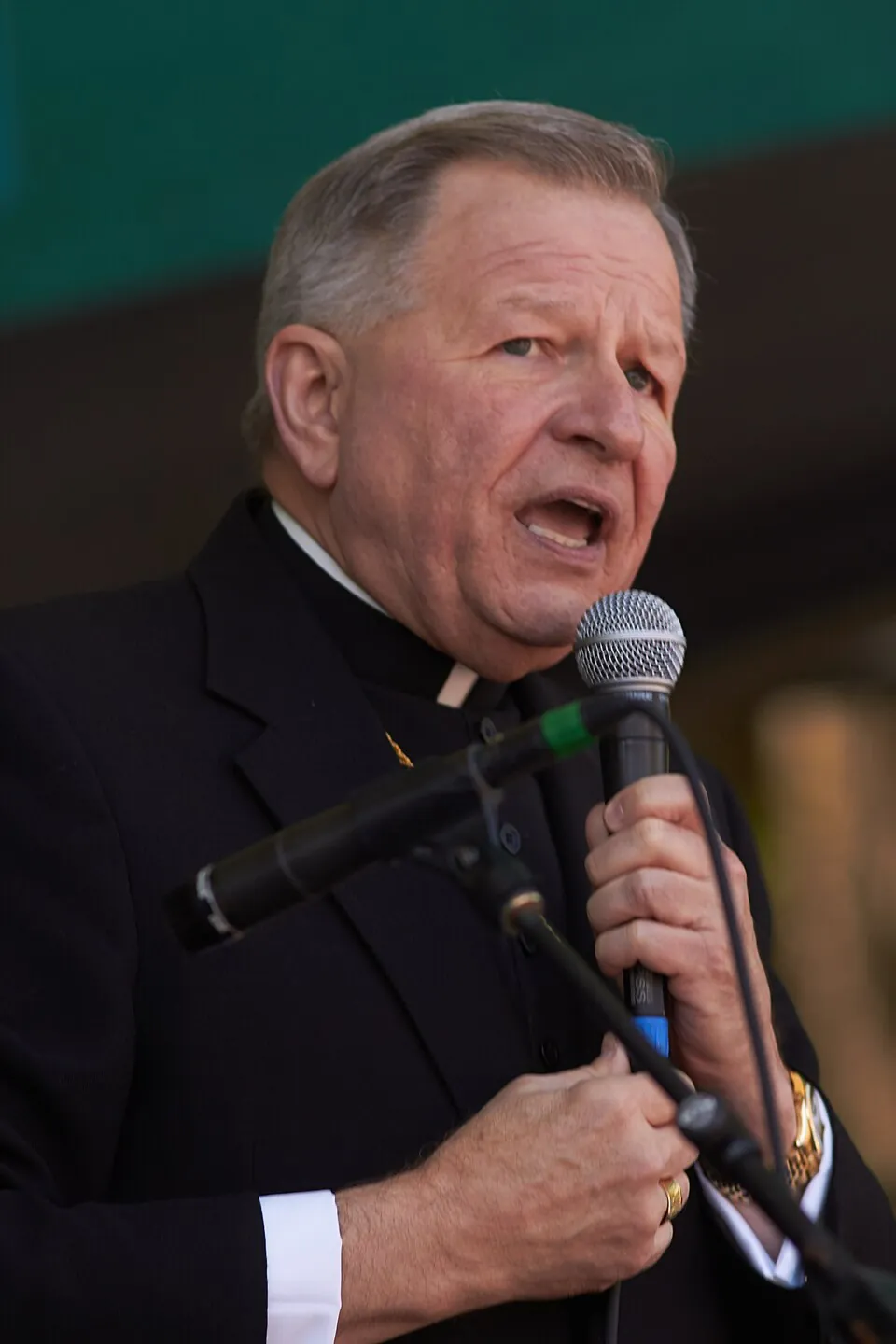Photo: New Orleans Archbishop Gregory M. Aymond, who will be succeeded by Bishop James Checchio of Metuchen, New Jersey; via Wikipedia.
A new challenge has emerged in the long-running Archdiocese of New Orleans bankruptcy case, as a group of bondholders threatens to derail a settlement plan that had gained strong support among survivors of clergy sexual abuse, NOLA.com reported yesterday. The bondholders, owed nearly $30 million, claim in court filings that the archdiocese negotiated with them in bad faith. Under the proposed settlement, they would receive $3 million—just 10% of what they are owed—which they argue is unfair.
Last week, attorneys for the bondholders questioned Archbishop Gregory Aymond and several top financial advisors under oath about the value of church assets, with additional depositions scheduled in the coming days. It remains unclear whether the bondholders intend to block the settlement entirely—potentially forcing U.S. Bankruptcy Judge Meredith Grabill to dismiss the case—or if the move is a negotiating tactic in the complex, years-long proceedings.
“They have the ability to stop the plan confirmation, which is a significant bit of leverage,” said Marie T. Reilly, a law professor at Penn State Dickinson Law who has tracked more than 40 church bankruptcies nationwide. “Could they be posturing? Yes. We will see.”
Attorneys for the bondholders and the archdiocese declined to comment. Archbishop Aymond has said he is “very hopeful and committed to bringing this bankruptcy to a conclusion that benefits the survivors of abuse,” adding that he continues to hold the matter “in prayer.”
Settlement Support and Remaining Opposition
For most of the five-and-a-half-year bankruptcy, opposition came largely from attorneys representing more than 600 survivors of clergy sexual abuse. That changed in July when the official court-appointed committee representing survivors announced it had reached a settlement with the archdiocese.
The proposed plan, since revised multiple times, would create a $180 million trust funded by the archdiocese, three insurers, and affiliated parishes and charities. An additional $50 million is expected from the sale of Christopher Homes, the church’s network of low-income senior housing. The plan also includes new child protection measures and reporting protocols designed to prevent future abuse.
By early September, many trial attorneys representing roughly one-third of the survivors had dropped their opposition, virtually guaranteeing the supermajority needed for approval. The “commercial committee,” which represents vendors and small businesses, also supports the plan.
The bondholders, however, remain staunchly opposed. They loaned the archdiocese $40 million in 2017 through a municipal bond offering that was not secured by collateral. Under bankruptcy law, secured creditors are typically paid first, while unsecured creditors—such as these bondholders—often recover only a fraction of their claims. The bondholders argue that the church “is solvent and has the ability to pay its proposed settlement with the survivors and all of its other creditors including the bondholders in full.”
Legal Battle Over a ‘Cramdown’
The dispute could culminate in what bankruptcy law calls a “cramdown.” To confirm a settlement, at least two-thirds of each creditor class must approve the plan. While survivors and trade creditors appear likely to meet that threshold, the bondholders are not expected to. The archdiocese could ask the court to approve the plan despite their objections.
Judge Grabill will then determine whether the plan satisfies the “cramdown” criteria—specifically, that it was proposed in good faith, fairly addresses the bondholders’ interests, and is equitable. Depositions of Aymond and his advisors are intended to uncover details about how the church’s real estate and other assets were valued in preparation for the hearing.
Bondholders have argued that they still cannot “understand the debtor and its affiliates’ complex financial web” and are questioning how financial consultants determined both property values and the worth of individual abuse claims.
A Unique and Closely Watched Case
The Archdiocese of New Orleans bankruptcy has stood out among the many church bankruptcies filed across the U.S. for its complexity, cost, and duration. If Judge Grabill confirms the plan over the bondholders’ objections, it would mark the first known instance of a “cramdown” opposed by non–sexual abuse unsecured creditors. The bondholders retain the right to appeal to the U.S. District Court.
More Coverage:
Pope Leo Names Successor to New Orleans Archbishop Amid $230 Million Sexual Abuse Settlement
New Orleans Archdiocese Raises Clergy Abuse Settlement Offer to $230 Million
Half of Abuse Claims in Archdiocese of New Orleans Bankruptcy Case Could Be Disqualified
New Orleans Archbishop Appears in Court Amid Heated Debate Over Clergy Abuse Bankruptcy Settlement
Judge Orders Archdiocese of New Orleans to Justify Prolonged Bankruptcy Amid Abuse Claims
NFL Saints Covers Up New Orleans Catholic Church Abuse Scandal
For Survivors of Catholic Church Sexual Abuse
If you are a survivor of clergy abuse within the Catholic Church, know that you still have legal rights, even if the abuse happened decades ago, even if the priest has died, or even if your diocese has filed for bankruptcy. Survivors across the country are stepping forward to demand justice and accountability.
Visit our Catholic Church Sexual Abuse Lawsuit Guide to learn how you can explore your options and take the first step toward healing and compensation.
You can also see if your case may qualify for legal action by filling out the confidential, secure form below. SurvivorsRights.com may help connect you with an attorney or law firm that specializes in clergy abuse cases.




